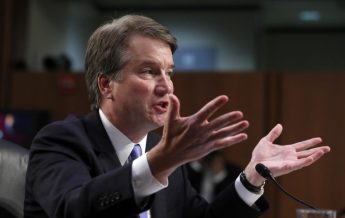Harrison Burns–Staff Writer

Contributed Photo
Judge Kavanaugh’s path for Supreme Court confirmation has been filled with heated conflict and unexcepted controversies, placing it in the center of Capital Hill’s spotlight in recent weeks. Even with Judge Anthony Kennedy’s retirement announcement in late June, the vacant seat has been the subject of keen interest by the media and populace. Interest only increased with President Trump’s announcement a week later that Brett Kavanaugh would be the nominee to replace him.
The following weeks set the stage for both the strong support and criticism Kavanaugh would face from the country’s political leaders and commentators. Most conservatives defended the nominee, citing his emphasis on strict adherence to the Constitution. This support was encapsulated in House Leader Paul Ryan’s statement following the nomination, “He [Kavanaugh] has shown that Constitutional principles are the ultimate guide for his opinions.”
On the other hand, Hillary Clinton voiced her fear of what Kavanaugh’s confirmation would result in, stating, “You know I used to worry that they wanted to turn the clock back to the 1950s, now I worry they want to turn it back to the 1850s.” She joins many of the detractors on the left, who oppose him on the grounds of his political bias particularly on social issues like abortion, same-sex marriage and gun-control.
This conflict came to a head when Kavanaugh’s Senate confirmation hearing commenced on September 4th. On the first day alone, local police arrested over 70 protesters during the proceedings. Tensions flared even during the standard procedures, with likely Democratic presidential candidates Kamala Harris and Cory Booker making extensive critiques of both the candidate and the hearing process.
In particular, Senator Booker made a dramatic scene when he announced that he would be releasing classified documents concerning Kavanaugh to the public. Booker himself described this breaking of senate rules as, “This is probably the closest I’ll ever have in my life to a ‘I am Spartacus’ moment.”
While some praised this as a courageous action, others criticized it as mere political theater. Professor Jeff Taylor from the Dordt College Political Science Department had a similar view when discussing the drama.
“Politicians, regardless of their party, do a lot of grandstanding in these kind of public hearings… I see [releasing documents] as more of a gimmick he used as he’s getting ready to run for president,” says Taylor.
This heightened partisanship on display is often cited as a symptom of the Trump-era of politics. Ruth Bader Ginsburg, a current Supreme Court Justice, lamented this lack of bipartisanship, “That’s the way it should be, instead of what it’s become, which is a highly partisan show. The Republicans move in lockstep, and so do the Democrats.” But while the contentious nature of the hearing has drawn attention, some point out that partisanship is not a new development within Trump’s presidency.
“That kind of resistance to approving the nominee of the president in the office of the Supreme Court by the opposition party, that really started back in the 1980’s… with Robert Bourke,” Taylor remarked when discussing Kavanaugh. Bourke was the first in a long line of both conservative and liberal judges to be vehemently opposed for the sake of attacking the opposite party, and it seems this most recent hearing is following that pattern.
But just as the hearings winded down, Senator Diane Feinstein revealed an unexpected and potentially lethal twist to stop Kavanaugh’s confirmation. An originally anonymous source accused Kavanaugh of serious sexual misconduct when he was in high school. The source was later revealed as Christine Blasey Ford, who released a letter detailing the accused assault she experienced by the then-seventeen-year-old Kavanaugh. Kavanaugh unconditionally denied the accusation in a statement.
The accusation is currently being investigated by the FBI and Senate with more information likely to be revealed in the coming weeks, leaving Kavanaugh’s already contentious confirmation more uncertain.
